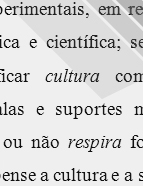

................................
1. The name. A coherent and structured notion of "culture" is requested. A student of exact, applied, and experimental sciences will generally emphasise the physical and mathematical language of technical and scientific culture. In contrast, a student of the humanities will tend to identify culture with philosophical, historiographical, artistic, and literary creations, whether in verbal or material forms, grammars, and symbolisms, as no textual or non-textual language exists beyond its legibility. Hence, the outline of an aporia of a synthesis that considers culture and its history. Throughout the 19th and 20th centuries, ethnology, anthropology (Tylor, Wissler, L. White), and sociology (Durkheim) highlighted the complex communicative, educational, and coercive cultural locutions (repressive: Rousseau, Nietzsche, Freud, Lacan) in the social legacy conceptualised by P. Bourdieu within the theoretical habitus as a tension resistant to and overcoming the historicity of a system of symbolic representations facilitated by the internal order/displacement of signs.
Commenting on the biblical episode of the expulsion, Paradise Lost, Kant envisioned the Nature/Culture division as the transgression of instinct (the basis of the "civilising process" explored by N. Elias, The Civilising Process, 1987). This moment is a specific anthropological self-founding event that surpasses a pre-established "natural harmony," as humans gain "consciousness of reason as a faculty to transcend the limits where other animals remain" (Ideas for a Universal History, 1994, p. 61; Sala, Teoria de la Cultura, 1999, p. 25). Examining the Kantian shift in The Phenomenology of Spirit, Hegel mobilised the Nature/History dialectic (explored as a discrepancy by Nietzsche, Foucault and Ricoeur), and in the insuperable synthetic limit—except through the post-Hegelian and metahistorical entry of the deos ex machina of utopia—he found the clear path to the hermeneutic division between Nature and Culture. C. Lévi-Strauss, delving into the cultural anthropology of proto-historic societies, interpreted the mythical apprehension of the opposition between the "natural" and cultural "artifact," a semantic field integrating terms such as "organisation," "hierarchy," "cult," and "work," and its humanising character (from Marx's Theses on Feuerbach; to Elias, H. Arendt).
